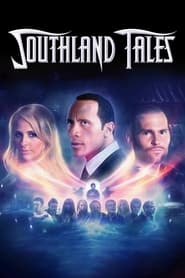— The soul of a monkey can't survive the dimensional threshold.
Trump-era 'Resistance' might have been cringe at times, but it wasn't as offensive as mid-naughties Bush-era 'dissent' such as this. One question: why does every scene climax with the character pointing the gun at their own head and threatening to kill themselves? Then again, if you were looking for a better metaphor for America's War on Terror, you would be hard to find a more deeply psychological one.
Perhaps one of the reasons I find Southland so frustrating as a critic is it lays bare the inadequacy of words to describe the enervating feeling of watching it—despite the fact that critics who love it tend to lob a lot of words at it, as if providing an inventory of its overstuffed cornucopia with exciting, frantic sentences will somehow make it come to life on the screen for others.[…]
It’s the kind of film whose responses seem to short circuit normal reactions. [I can easily] sound like someone who just can’t appreciate some sophisticated register of sophomoric humor—but shouldn’t questions of pacing, framing, and build-and-release matter to an ostensible comedy, even one that functions within an absurdist, tragicomic framework? Then again, the argument that the film is intentionally anti-entertainment goes a long way to convincing the unconvinced that we’re not seeing the forest for the trees. Its admirers insist that its mechanical breakdown is part of the point—and, evidently, the fun. It’s as though I would need to come up with new ways of defining cinematic functionality itself to understand Kelly’s film.
[…]
Southland Tales is beyond cynicism, beyond sadness, beyond entertainment, beyond narrative, really, and its disinterest in corralling [all] its broken pieces into anything resembling a pleasant, coherent, or functioning machine makes it a reflection of a world that has become inoperative.
— Michael Koresky (Reverse Shot)
A cult has [formed] around the film, due in part to its mad ambition and unhinged world-building beckoning to curious, particular tastes. But the fandom’s expansion can also be attributed to the shrinking distance between writer-director Richard Kelly’s hysterical alternate United States and our day-to-day reality. [The] deliberate overstuffed quality simulates Trumpism’s non-stop barrage of crises and bad news with better fidelity than any other film at its titanic scale.
— Charles Bramesco (Decider, 2021)
Here is everything we saw over twenty or more years of culture—cable television wars, open discussions of sex, disaster films, sexy glamour stars who really can't act, and a ton of commercials—all jammed into one movie that doesn't really seem to care that it's all going on. Or, to put it another way, is reminding us that it's all going on, and we need to begin caring. It doesn't matter if the bomb goes off or not, or if society is reborn through a pimp. We've reached the apex of culture. Have a nice apocalypse.
— Peter Labuza: Approaching the End: Imagining Apocalypse in American Film (2014)
Synopsis: Set in the futuristic landscape of Los Angeles on July 4, 2008, as it stands on the brink of social, economic and environmental disaster. Boxer Santaros is an action star who's stricken with amnesia. His life intertwines with Krysta Now, an adult film star developing her own reality television project, and Ronald Taverner, a Hermosa Beach police officer who holds the key to a vast conspiracy.

